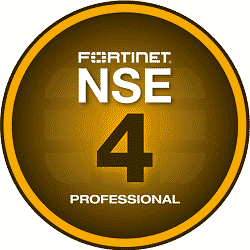Course Overview
In this course, you will learn how to use the most common FortiGate networking and infrastructure features.
Topics include features commonly applied in a complex or larger enterprise or MSSP networks, such as advanced routing, redundant infrastructure, virtual domains (VDOMs), zero trust network access (ZTNA), SSL VPN, site-to-site IPsec VPN, single sign-on (SSO), and diagnostics.
Objectives
After completing this course, you will be able to:
- Analyze a FortiGate route table
- Route packets using policy-based and static routes for multipath and load-balanced deployments
- Divide FortiGate into two or more virtual devices, each operating as an independent FortiGate, by configuring virtual domains (VDOMs)
- Understand the fundamentals and benefits of using ZTNA
- Offer an SSL VPN for secure access to your private network
- Establish an IPsec VPN tunnel between two FortiGate devices
- Implement a meshed or partially redundant VPN
- Diagnose failed IKE exchanges
- Offer Fortinet Single Sign-On (FSSO) access to network services, integrated with Microsoft Active Directory (AD)
- Deploy FortiGate devices as an HA cluster for fault tolerance and high-performance
- Diagnose and correct common problems
Prerequisites
- Knowledge of OSI layers
- Knowledge of firewall concepts in an IPv4 network
- Knowledge of the fundamentals of FortiGate, as presented in the FortiGate Security course
Target Audiance
- Networking and security professionals involved in the design, implementation, and administration of a network infrastructure using FortiGate devices should attend this course.
- This course assumes knowledge of basic FortiGate fundamentals. You should have a thorough understanding of all the topics covered in the FortiGate Security course before attending the FortiGate Infrastructure course.
Schedule Dates
Implementing Fortinet Collaboration NSE 4 FortiGate Infrastructure Core Technologies
Implementing Fortinet Collaboration NSE 4 FortiGate Infrastructure Core Technologies
Implementing Fortinet Collaboration NSE 4 FortiGate Infrastructure Core Technologies
Implementing Fortinet Collaboration NSE 4 FortiGate Infrastructure Core Technologies
Course Content
- Understanding the ecosystem and key components.
- Exploring the basics of FortiGate architecture and functionalities.
- Integrating FortiGate into the broader security fabric for enhanced protection.
- Configuring firewall policies and content filtering for network security.
- Implementing Virtual Private Network (VPN) technologies for secure remote access.
- Utilizing web filtering and application control to manage user access and behavior.
- Optimizing network performance through traffic shaping and QoS policies.
- Managing and monitoring FortiGate devices effectively for efficient network operations.
FAQs
The Fortinet Collaboration NSE 4 FortiGate Infrastructure Core Technologies Course is a comprehensive training program designed to equip professionals with the necessary skills to implement and manage FortiGate infrastructure core technologies.
This course is designed for IT professionals, network administrators, security engineers, and anyone interested in learning about FortiGate infrastructure core technologies.
The course covers topics such as firewall policies, security fabric, IPsec VPN, SSL VPN, FortiGate diagnostics, troubleshooting, and more.
Participants are expected to have a basic understanding of networking concepts and protocols. Prior experience with Fortinet products and technologies is beneficial but not mandatory.
The course duration typically ranges from a few days to a week, depending on the training provider and the delivery format (e.g., full-time, part-time, online).

 4.7
4.7




